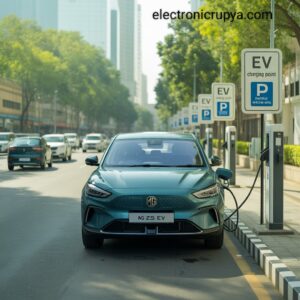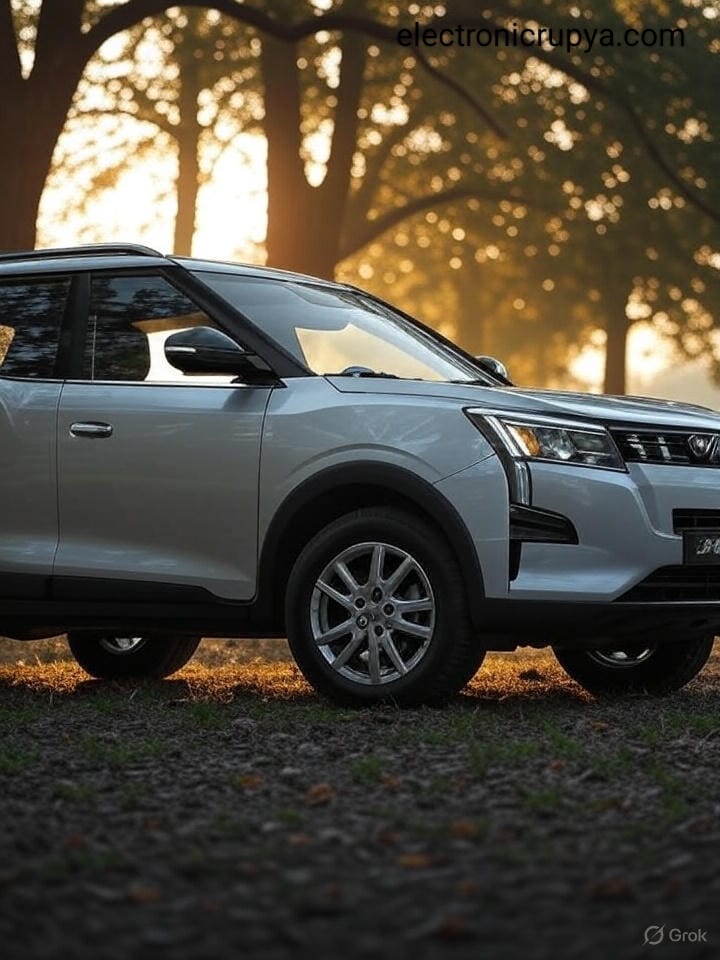INTRODUCTION

Electric cars are becoming a huge trend in India with innovative designs, especially in 2025. With fuel prices going up
and people wanting to go green, EVs (Electric Vehicles) are the new smart choice for many. We need to setup Charging Stations everywhere. Before switching from petrol or diesel to electric, there’s one big question that comes to mind —
how much does it really cost to own an electric car in India? Well, the price of buying the car is
just the beginning. You also need to think about Charging Stations, servicing, insurance, and a few other
things.
1. Price of Buying an Electric Car
Let’s start with the most obvious part — the price tag. Electric cars are usually more expensive than regular petrol or diesel cars when you first buy them. But don’t worry, prices have come down a lot in the past few years. Plus, the Indian government gives subsidies under schemes like FAME II (Faster Adoption and Manufacturing of Electric Vehicles) to encourage people to buy EVs.
In 2025, some of the more affordable electric cars in India include the Tata Tiago EV, which
starts at around ₹8.5 lakh. Then there’s the Tata Nexon EV, one of the most popular choices,
which costs between ₹14 to ₹17.5 lakh depending on the variant. If you’re looking for something even cheaper, the MG Comet EV is a small city car that starts around ₹6 lakh. On the premium side, there are cars like the Hyundai Ioniq 5 and the BYD Atto 3, which are priced between ₹30 to ₹50 lakh.
Also, depending on your state, you might get additional discounts or benefits like no road tax or registration charges. So, the final price you pay could be much lower than the showroom price.
2. Charging Costs
Now let’s talk about charging. One of the biggest reasons people love EVs is because charging
them is much cheaper than filling petrol or diesel.
If you charge your car at home, you’ll pay for the electricity used. In most states, the electricity
rate is between ₹7 to ₹10 per unit (1 unit = 1 kWh). For example, the Tata Nexon EV has a
battery of about 40.5 kWh. So, charging it fully at home might cost you around ₹300 to ₹350.
Once charged, it can run for 400 to 450 kilometers. That means the cost per kilometer is usually
less than ₹1 way cheaper than petrol, which can cost ₹6 to ₹8 per km in city driving.
If you use a public fast charger, the price is a little higher. Fast Charging Stations usually charge between ₹15 to ₹25 per unit. But the good part is that they charge the battery much quicker
sometimes in just an hour or less. Even then, a full fast charge may cost around ₹700 to ₹900,
which is still less than a full tank of petrol for most cars. Charging Stations are much more efficient.
3. Maintenance and Servicing
Here’s where electric cars really save you money in the long run. Traditional cars have engines with hundreds of moving parts that need regular maintenance like oil changes, filter
replacements, clutch repairs, and so on. But electric cars don’t have an engine like that. Instead, they run on a motor and battery, which don’t require as much attention.
This means you don’t need to worry about changing engine oil, replacing spark plugs, or fixing a radiator. Most electric cars only need occasional servicing for the brakes, tyres, and software updates. On average, you might spend only ₹3,000 to ₹5,000 per year on maintenance for an EV. In comparison, petrol or diesel cars might cost you ₹10,000 to ₹15,000 every year for service.
4. Battery Replacement
This is a topic that a lot of people worry about. EV batteries are expensive, and if they need to
be replaced, it can cost a lot. But here’s the good news EV batteries are built to last a long time. Most manufacturers give a battery warranty of 8 years or around 1.6 lakh kilometers.
In 2025, battery technology has improved a lot, and most users won’t need to replace their
battery for at least 7 to 10 years. And by that time, battery prices are expected to drop even
more. Right now, a full battery pack could cost ₹4 to ₹6 lakh depending on the car. But with
better technology and longer lifespans, it’s not something most people need to worry about right
away.
5. Insurance and Road Tax
Just like regular cars, you need to insure your electric car. The insurance cost depends on the
price of the vehicle, but many insurance companies now offer special discounts for EVs. This is
because EVs are seen as safer and more eco-friendly.
Also, in many Indian states like Delhi, Maharashtra, and Gujarat, electric cars are given special
benefits like zero road tax and reduced registration fees. These small savings add up and make
owning an EV even more attractive
6. Overall Cost of Ownership
So, when we add everything together the buying cost, Charging Stations, maintenance, insurance, and savings from government benefits electric cars can actually be cheaper to own in the long run, even if the initial cost is a bit high.
Let’s say you drive 15,000 km a year. A petrol car could cost you around ₹90,000 in fuel
annually (₹6 per km).
An electric car might only cost around ₹15,000 to ₹20,000 for the same
distance. That’s a huge saving every year. And over 5 years, that adds up to over ₹3.5 lakh in
fuel savings alone.
Conclusion
To sum it up, owning an electric car in India in 2025 is not just good for the environment — it can
also be great for your wallet. While the buying price might still be a little higher than a petrol car,
the low cost of Charging Stations and maintenance makes EVs a smart choice in the long run. Plus, with
more models, better battery life, and growing charging infrastructure, switching to electric is
becoming easier every day.
If you’re someone who wants to save money, reduce pollution, and enjoy the latest technology,
then owning an electric car and a Charging in Charging Stations could be the perfect decision for you or your family. The future is
electric and it’s already here!






